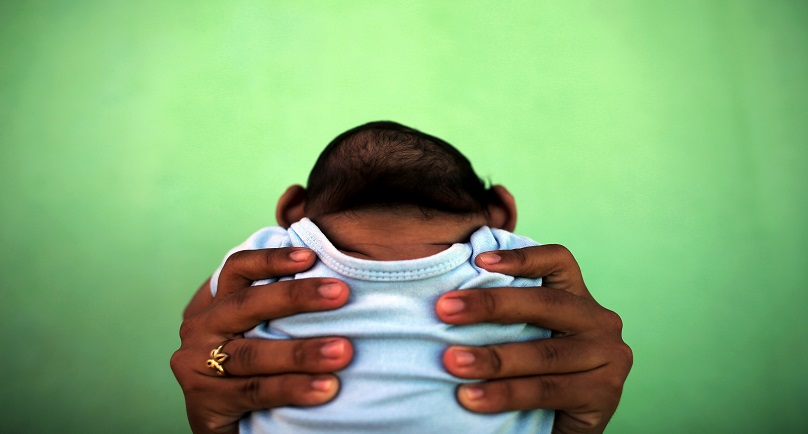Image: A 4-month-old baby born with microcephaly is held by his mother in front of their house in Olinda, near Recife, Brazil, February 11, 2016
By Stephanie Nebehay and Bill Berkrot
GENEVA/NEW YORK (Reuters) – With debate growing over the safety of holding the Olympics in Brazil amid the ongoing Zika virus outbreak, the World Health Organization’s Emergency Committee on Zika will meet in the coming weeks to evaluate the risks tied to going on with the Games in August, a WHO spokeswoman said on Friday.
“The Emergency Committee meeting will consider the situation in Brazil, including the question of the Olympics,” WHO spokeswoman Nyka Alexander told Reuters in response to a query.
WHO makes risk assessments of a public health issue and it would be up to the International Olympics Committee (IOC) to decide on holding the event in Rio de Janeiro, due to start on Aug. 5, she said.
“It is not within our mandate” to make decisions on holding the Olympic Games, Alexander said.
A spokesman for Rio 2016 said they continue to follow WHO recommendations on Zika.
Athletes will have to make their own decisions as to whether to risk Zika for the potential glory of Olympic gold. Cyclist Tejay Van Garderen this week withdrew from consideration for the U.S. team over concerns that the virus could present risks for his pregnant wife.
The virus can also be transmitted via unprotected sex with an infected man.
Dr. David Heymann, chairman of the WHO committee of independent experts, told Reuters on Monday that postponing the Rio Olympics because of fears it could speed the spread of the Zika virus would give a “false” sense of security because travellers are constantly going in and out of Brazil.
It will be winter in Brazil when the Olympics begin, so the mosquitoes that carry the virus will be less abundant, WHO experts said.
WEIGHING RISKS
A public letter was issued last week signed by 150 public health experts and scientists calling for the Olympics to be delayed or moved over fears that the Games could speed up the global spread of the Zika virus.
Top U.S. health officials agreed with WHO experts that Zika did not pose enough of a risk to postpone or move the Olympics. Dr. Tom Frieden, director of the Centers for Disease Control and Prevention, last week said travel to the Olympics would represent less than one quarter of 1 percent of all travel to Zika-affected areas, and that the risk was low except for pregnant women.
For women who are pregnant or hoping to become pregnant, the recommendation is to stay away from areas with Zika outbreaks.
It has been determined that Zika is a cause of microcephaly, a rare birth defect characterized by unusually small head size and potentially severe developmental problems.
World health officials on Friday expressed concern that Zika may cause a far wider range of severe abnormalities in babies and called for broader surveillance beyond microcephaly of infants born in the 37 countries and territories in the Americas, where Zika has been spreading.
In hardest hit Brazil, authorities have confirmed more than 1,400 cases of microcephaly believed to be linked to Zika.
U.S. Senator Jeanne Shaheen had asked WHO to examine whether the Games in Rio de Janeiro could accelerate global spread of the mosquito-borne virus.
Alexander said the date for the next meeting of the WHO Emergency Committee was still being decided, but that it would be held this month.
Heymann told Reuters that it was tentatively set for June 21. The panel of independent experts meets every three months and its last meeting was on March 8.
Heymann also said national health authorities should advise their respective athletes and citizens of child-bearing age to protect themselves against mosquito bites with repellent while in Brazil and to practice safe sex on return for at least three weeks.
(Reporting by Stephanie Nebehay in Geneva and Bill Berkrot in New York; editing by Andrew Roche and G Crosse)
Copyright 2015 Thomson Reuters. Click for Restrictions.


